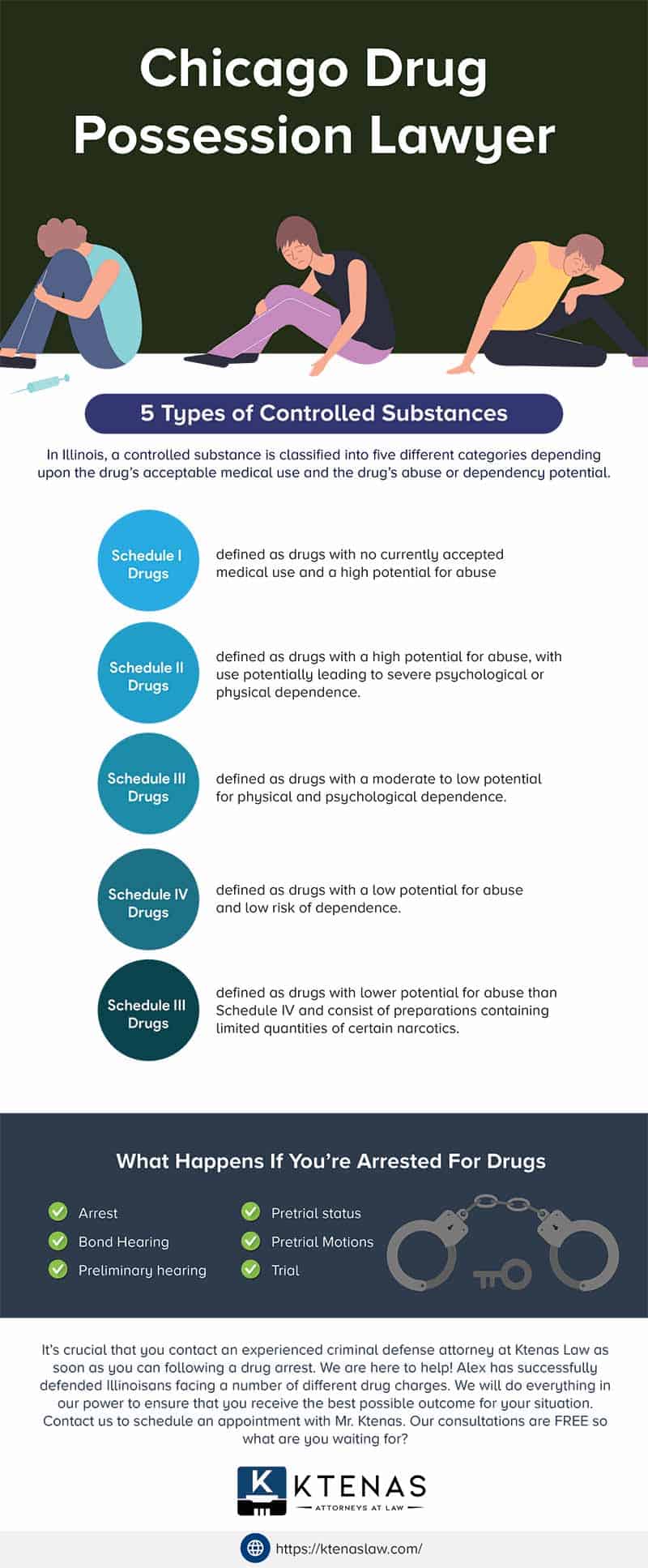
Call Us Today For a Free Consultation 312-800-1626 312-800-1626
Call Us Today For a Free Consultation 312-800-1626 312-800-1626


If you are charged with possession of a controlled substance in Chicago or within Cook County, it is very important to understand exactly how the prosecutor and the police officers intend to prove the case against you. In order to prove you guilty, the prosecutor will use every little detail about your interaction with the police officer to show that you were in possession of a controlled substance.
The prosecutor will use any statement that you make to the police about the drugs, where the drugs were located when the officer found them, the way the drugs were packaged, and the location of the stop to try and show the judge that you are guilty.
If you have been involved in the possession of a controlled substance, it important to have a proficient defense attorney on your side to fight for your rights.
When you are first stopped by a police officer, you should not talk to him without a lawyer present. If they start questioning you about any potential drugs, do not give them permission to search your person or your vehicle.
If the police find something within your vehicle, it is very important at that point to remain silent and request to speak to an attorney. I cannot tell you the countless times I have seen prosecutors prove their case in Markham courthouse and at 26th and California based on the defendant admitting that the drugs were their drugs.

In Illinois, a controlled substance is classified into five different categories depending upon the drug’s acceptable medical use and the drug’s abuse or dependency potential.
Schedule I drugs are defined as drugs with no currently accepted medical use and a high potential for abuse. Some examples would include:
Schedule II drugs are defined as drugs with a high potential for abuse, with use potentially leading to severe psychological or physical dependence. Some examples would include:
Schedule III drugs are defined as drugs with a moderate to low potential for physical and psychological dependence. Some examples of Schedule III drugs are:
Schedule IV drugs are defined as drugs with a low potential for abuse and a low risk of dependence. Some examples of Schedule IV drugs include:
Schedule V drugs are defined as drugs with lower potential for abuse than Schedule IV and consist of preparations containing limited quantities of certain narcotics. Some examples of Schedule V drugs are:

If you have been arrested for possession of a controlled substance, the police officer is going to first take you to the police station and do all the required paperwork to process you through the jail. He will collect all the evidence against you and send it to the crime lab to get tested.
After the officer is done processing your case, he can release you with a notice to appear in court or bring you in front of a judge for a pretrial release hearing. The judge will determine whether or not you should be released from custody and if so, what conditions you will have upon release.
Typically the prosecutor will have the drug results in about 3 weeks after they have been sent to the Illinois State Police lab. Once the prosecutor has the results of the lab, a preliminary hearing will be held to determine if the prosecutor has enough evidence against you to proceed to trial.
After a preliminary hearing, the prosecutor and the defense attorney will usually agree to a continuance date in order to get all the evidence for the case. Evidence will usually include police reports, videos, lab reports and a list of any witnesses that the prosecutor may use against you.

After the prosecutor has turned over all the evidence, the defense lawyer will go through all the evidence and look to see if there are any pretrial motions to file with the court.
Some examples of pretrial motions are a motion to suppress evidence & a motion to suppress statements. This can be the most critical stage for a defense attorney.
Your best chance to beat the charges will often depend on your attorney’s ability to show the judge that the arrest and the stop by the police officer were illegal.
If your possession of a controlled substance case makes it to a trial, your lawyer will have to go through the evidence and cross examine the police officer in order to show that you either were not in possession of the drugs or that they were not illegal drugs in the first place.
In order to do this, your attorney will need to know every single detail about the case, including where the drugs were located when you were arrested and who else was present when you were arrested.
If you are found not guilty of the charges, you are free to go and you will have a clean record. If you are found guilty, you will need to have a sentencing hearing to determine what the judge will sentence you to. To see what the potential punishments are for drug cases, read the next paragraph below.
In Illinois, possession of a controlled substance is a felony offense and the class of offense can range from a class 4 felony to a class x felony.
If you are charged with possession of a controlled substance, the minimum punishment that you can receive is 1 year in the Illinois department of corrections and the maximum is 30 years in the Illinois department of corrections.
The punishment that you could be facing will depend on what type of drugs you are accused of possessing and the number of drugs that were in your possession. Check out the chart below to see exactly what charges you are facing!
| Cocaine | Heroin /LSD | Cannabis | LSD/Ecstasy | Methamphetamine |
| 0-15 Grams | 0-15 Grams | 100-499 G | 0-14 Grams | 0-4 grams |
| Class 4 Felony | Class 4 Felony | Class 4 Felony | Class 4 Felony | Class 3 Felony |
| 1-4 years prison | 1-4 years prison | 1-4 years prison | 1-4 years prison | 2-5 years prison |
| 15-100 Grams | 15-99 Grams | 500-1999 gram | 15-99 Grams | 5-14 grams |
| Class 1 Felony | Class 1 Felony | Class 3 Felony | Class 1 Felony | Class 2 Felony |
| 4-15 years prison | 4-15 years prison | 2-5 years prison | 4-15 years prison | 3-7 years prison |
| 100-400 grams | 100-399 grams | 2,000-4,999 grams | 100-399 grams | 15-99 grams |
| (Class x Felony) | (Class x Felony) | (Class 2 Felony) | Class x Felony | Class 1 Felony |
| 6-30 years prison | 6-30 years prison | 3-7 years prison | 6-30 years prison | 4-15 years prison |
Now that you know the potential charges against you and the punishments, it is important that you talk to a knowledgeable and skilled Cook County drug defense attorney to beat the charges.
A skillful attorney will look at the circumstances of your arrest and know the best possible ways to beat the case. For example, a knowledgeable attorney can get the case thrown out if he can show that the police officer was just harassing you and there was no reason for the cop to stop you in the first place.
Another possibility is for your lawyer to show that there is no possible way that the drugs were your drugs. Depending on the circumstances, a qualified trial attorney in Chicago should be able to show the judge that the prosecutor cannot meet their burden and prove that you are in actual or constructive possession of the drugs.
Furthermore, a defense attorney that is familiar with the judges and the prosecutors may be able to get you in a deferred prosecution program in order to keep the felony off your record and keep you out of Cook County Jail.
If you are charged with possession of drugs, it is very important to contact an attorney as soon as possible. At Ktenas Law, we are very familiar with the Illinois law regarding illegal searches and seizures.
We have handled many matters where the police have searched an individual and the court held that there was no probable cause and threw the evidence away. Call today to go over your options of how we can help you beat the case!

Alexander Ktenas is a respected trial attorney in the Chicagoland area, known for his tenacious work ethic and deep knowledge of the law. As a managing partner at Ktenas Law, he has successfully conducted hundreds of trials, applying an aggressive trial strategy to defend his clients in a variety of cases, primarily in criminal and DUI defense.
Attorney-Approved Content: A collaboration between AI, legal editors, and experienced attorneys, delivering accurate, human-verified content.



